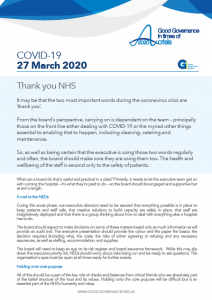Thank you NHS
27 March 2020

It may be that the two most important words during the coronavirus crisis are ‘thank you’.
From the board’s perspective, carrying on is dependent on the team – principally those on the front line either dealing with COVID-19 or the myriad other things essential to enabling that to happen, including cleaning, catering and maintenance.
So, as well as being certain that the executive is using those two words regularly and often, the board should make sure they are using them too. The health and wellbeing of the staff is second only to the safety of patients.
What can a board do that’s useful and practical in a crisis? Primarily, it needs to let the executive team get on with running the hospital – it’s what they’re paid to do – so the board should be engaged and supportive but at arm’s length.
A nod to the NEDs
During this acute phase, non-executive directors need to be assured that everything possible is in place to keep patients and staff safe, that creative solutions to build capacity are safely in place, that staff are imaginatively deployed and that there is a group thinking about how to deal with everything else a hospital has to do.
The board should expect to make decisions on some of these matters based only as much information as will provide an audit trail. The executive presentation should provide the colour and the paper the basics: the decision required (including why), the costs, the risks of either agreeing or refusing and any necessary assurances, as well as staffing, accommodation, and supplies.
The board will need to keep an eye on its risk register and board assurance framework. While this may slip down the executive priority list, NEDs should worry about risks being run and be ready to ask questions. The organisation’s eyes must be open at all times ready for further events.
Holding onto core purpose
All of this should be a part of the key role of checks and balances from critical friends who are absolutely part of the belief structure of the trust and its values. Holding onto the core purpose will be difficult but is an essential part of the NHS’s humanity and value.
For now, nobody is going to be interested in the regular mountain of data boards and committees usually trawl through – frankly it’s questionable what value some of these add in the best of times. But we all know that when we get through this phase, someone somewhere is bound to ask for them.
When that happens, of course they must be available but there’s no need to go beyond the bare essentials. Given the focus of need it’s unlikely that much would change as a result of going through these reports so why use valuable time on them?
How effective boards should be operating
Meeting in public is not an option and it is doubtful that anything other than an electronic or virtual meeting is justifiable – our bulletin of 23 March talks about virtual board meetings and we’ll be publishing more about these in future blogs.
Most boards meet monthly either in public or informally in private. Some will want to meet more often but this really should just be for short sharp discussions. The temptation to meet more often and for longer needs to be resisted.
The board secretary will need to make sure that the record of these meetings is crisp and accurate, especially if the voiceover is what gives the meeting its colour. Others will be using a COVID-19 taskforce approach – and it would be sensible to include NEDs in these – which should be the basis of what keeps the board up to speed between meetings.
A common thread relates to the importance of communications – between board members (especially when it is not possible or desirable for everybody to be involved all the time) as well as from the board to staff and patients.
We began with two little words and it is important to end with them: thank you for what you are doing during this difficult time.
A model agenda
1. COVID-19 – urgent issues:
a. patient safety
b. capacity
c. infection control
d. staff deployment
e. staff well being
f. matters requiring board approval or endorsement
g. update from trust COVID-19 taskforce/local system
2. Advice, requirements and guidance from NHSE/I
3. Board assurance framework/risk register – including issues arising from other activity in the trust
4. [COVID-19 – planning for the next phase]
5. Minutes of the previous meeting
6. Post-meeting communications
Sharing information
Keeping open lines of communication is vital in these extraordinary times – to share how your board is coping with the COVID-19 crisis, or to ask questions or seek advice from the experienced team at GGI, please email advice@good-governance.org.uk.

